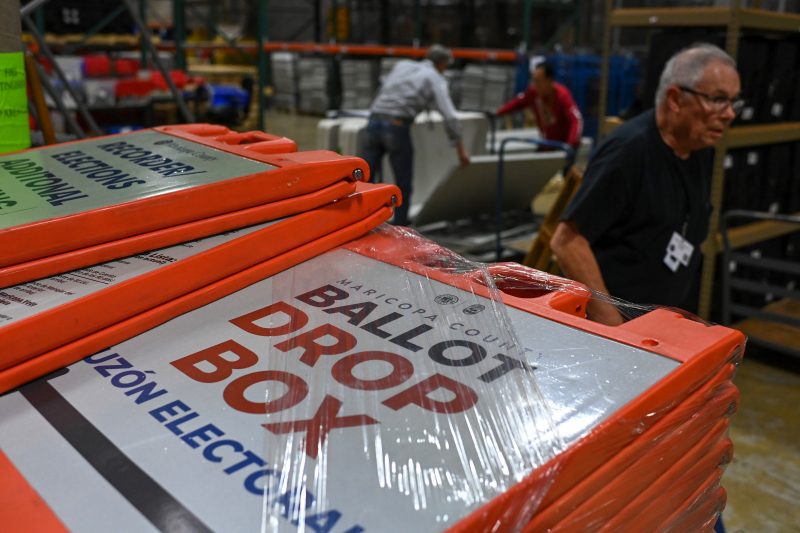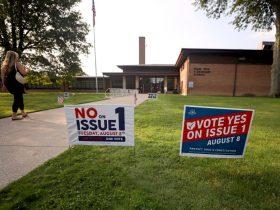Former president Donald Trump and Republican allies have long vilified mail-in voting and what is called ballot harvesting, alleging without presenting evidence that the practices are rife with fraud and encouraging Republicans to vote in person instead.
“There is no way you can go through a mail-in vote without massive cheating,” Trump said in August 2020. “GET RID OF BALLOT HARVESTING!” he wrote in a Twitter message that same year, referring to entities in certain states that are authorized to collect ballots and deliver them to elections officials.
But now, after disappointing election results in 2020 and 2022, Republicans close to Trump are seeking to raise hundreds of millions of dollars to build programs that would encourage some of the practices that the former president and other Republicans once decried, according to documents reviewed by The Washington Post and interviews with GOP operatives involved in the programs.
“THE LEFT BEAT US AT THE BALLOT GAME!” reads a pitch to donors from Turning Point Action, a Republican group trying to raise $108 million to create what it bills as “the LARGEST and MOST IMPACTFUL BALLOT CHASING OPERATION THE MOVEMENT HAS EVER SEEN,” according to a prospectus obtained by The Washington Post.
Many of the people involved in the efforts worked for Trump or Trump-affiliated groups in the last election, and some have espoused claims that the 2020 election was stolen. The Post identified at least five efforts by groups led by prominent Trump allies or former Trump advisers, and strategists involved in the groups say they are competing for donors and support. All appear to have been created within the past year.
The groups have little experience in such work, and the jockeying is generating concern among some Republicans. It is unclear how many Republican donors will give to such measures and whether many GOP voters who have been skeptical of mail-in voting will participate.
Allowing third-party vendors to collect and return ballots from voters — an activity labeled ballot harvesting by many GOP critics — is legal in some states. Mail-in voting allows registered voters to send their ballots through the mail before Election Day. In the 2020 election, as the United States was battling the coronavirus, 69 percent of voters nationwide cast their ballots by mail or before Election Day, according to the U.S. Census Bureau. That was the highest rate ever — and up from 40 percent in 2016, the bureau’s data shows.
Democrats have tended to fare better in early and mail-in voting, while Republicans have generally performed more strongly in in-person voting on Election Day. The majority of the fledgling GOP operations are focused almost exclusively on early voting in its various forms.
The formation of groups focused on early voting is undoubtedly a major shift for Republicans, with the Republican National Committee’s official arm, operatives and outside groups all competing to launch campaigns to get Republicans to vote before Election Day 2024.
An RNC spokeswoman says the national party will create state-by-state websites to tell voters how to cast their ballots early and “conduct focus groups and message testing on how best to communicate with Republican voters on pre-Election Day voting, equipping Republican leadership and candidates to deliver a unified message nationwide.” RNC executives have held meetings with multiple lawmakers and strategists seeking national buy-in for a program they are calling “Bank the Vote.”
Most of the officials said such efforts are necessary because the party has been hurt in the past by discouraging voting before Election Day. In a speech to the party’s top donors recently, Trump said he would embrace early-voting efforts because Democrats were already doing the same, although he said he hoped that the practices eventually would become illegal, according to audio obtained by The Post.
“I wish we still had single-day voting, but that’s just not the world we live in, and so if we would prefer to keep losing, then you just don’t do anything,” said Tyler Bowyer, a top executive with Turning Point Action. “The way I explain it best to our activists is like, election integrity is a great defense, and defenses win championships. But when your defense is lacking, you have to make up for it with a great offense.”
The group that purports to have the largest ambition appears to be Turning Point Action, according to a fundraising prospectus reviewed by The Post. The group was founded by Trump ally Charlie Kirk, who wrote a Fox News op-ed in 2020 headlined: “Mail-in voting push is Democratic power grab.”
Turning Point Action’s effort is aimed at reinventing how Republicans mobilize infrequent voters and is modeled after how Democrats and liberal groups have based full-time community organizers in key battlegrounds.
The group is raising money to hire 500 full-time organizers in Arizona, 800 in Georgia and 350 in Wisconsin, at a cost of $99 million to compensate each staffer at a $60,000 salary, according to the fundraising materials.
That effort has generated significant criticism from others in the Republican Party who say that the budget is inflated and that Turning Point Action does not have the experience needed to undertake such an operation. Drew Ryun, who runs the political data firm Campaign Sidekick, said the group is asking for more money than it could realistically spend in those states.
“A budget of $108 million would be on the high end of a national effort to register new voters and turn them out, either by having them vote by mail, early or on Election Day. And by national, I mean 16 to 20 targeted states, not three,” Ryun said. “A budget like this is perplexing, given their very thin past track record. If I am a donor, I am asking for a little more detail regarding their efforts in 2020 and 2022 that would justify something of this nature.”
Ryun said his software, which he said Turning Point used during last year’s midterms, indicated that the group contacted fewer than 100,000 voters in 2022. Others raised questions about whether the group could effectively train the number of workers envisaged.
Bowyer said Ryun’s estimates are incomplete because Turning Point Action stopped using Campaign Sidekick’s software last year after finding the program was too slow to add users at the group’s large gatherings. Turning Point Action is building its own app to serve its program, he said.
Chris Carr, a former top official in the Trump campaign and at the RNC, is working with Tommy Hicks, a former co-chair of the RNC and a major Texas donor, along with former RNC aides to raise $40 million to $60 million to target voters in six states as part of a group they will launch this fall, according to people familiar with the effort who spoke on the condition of anonymity to disclose details.
Carr said in an interview that one of the goals is to convince “low-propensity voters” — those who are eligible but do not always vote — that they should use mail-in ballots. He would not identify the states that his group plans to target.
In the past, GOP voters have rejected efforts to use outside entities to collect ballots, Carr said.
“I know here in Nevada, when they have their canvassers knocking from door to door — would you like a volunteer of our organization to collect your ballot and deliver it to the election department? Republican voters overwhelmingly said, ‘No, I’m not going to give my ballot to a stranger,’” Carr said of his home state. “The easier and the more effective way to get low-propensity voters to vote is to vote by mail, and educating them that their ballot is going to be safe.”
Some of the people now organizing early-voting efforts were vocal critics of voting by mail in the past — and have continued to falsely claim that the 2020 election was stolen.
In Arizona, failed gubernatorial candidate Kari Lake, who is considering running for the U.S. Senate next year, announced in May that she would launch “the largest ballot chasing operation in our nation’s history.”
The program is to be run by a 501(c)4 nonprofit organization that does not have to disclose donors and is to be led by Merissa Hamilton, a Phoenix activist who has become a prominent organizer in Arizona’s election-denier movement.
“Ballot chasing is expensive and, frankly, the answer to which group is going to do it best is who can raise the money to get it done,” said Caroline Wren, a pro-Trump fundraiser who works closely with Lake. “The Democrats have invested hundreds of millions in ballot chasing operations for over a decade. Republicans are so far behind that, frankly, every conservative organization should be raising and spending money to build out this critical infrastructure in time for 2024 or we are doomed.”
Asked for the group’s fundraising goal, Wren responded with an emoji sticking its tongue out with a dollar sign.
In Georgia, a county party launched an initiative called “Unite the Right” to encourage Republicans to vote early and by mail and to help ensure the ballots are counted by tracing and “curing” them, which allows voters in some states to fix any mistakes. Lumpkin County GOP chair Katherine James said the party also is developing customized scripts for targeting different types of voters, such as college students and churchgoers. The program was launched in rural Lumpkin County at an event with “Unite the Right” signs and a soundtrack featuring the Talking Heads’ “Burning Down the House.”
“It takes what the Democrats have done, turns it around and does it better,” James said at the state party convention in June. “And legally, because we’ve got to do that. We cannot keep doing the things that we used to do, because we will lose.”
Party officials later changed the program’s name to “United Saves America” to avoid echoing the name of the “Unite the Right” rally in Charlottesville in 2017, which featured neo-Nazis and white nationalists, one of whom killed a counterprotester with his car. The new Georgia state party chairman, Josh McKoon, said party executives are reviewing James’s program.
James said she presented his proposal to the RNC this spring and was working with party leaders to roll out the program nationwide.
“We know they’re going to cheat. They just can’t cheat too much because they’ll get caught,” she said of Democrats.
James could not be reached for comment. Some other local officials, while previously skeptical of such efforts, said they now deemed them necessary.
“The laws are the laws,” said Rich Elsarelli, the Republican Party chairman in Lumpkin County’s neighbor Hall County. “If we have a week-long of voting, we need to embrace that and move on.”








